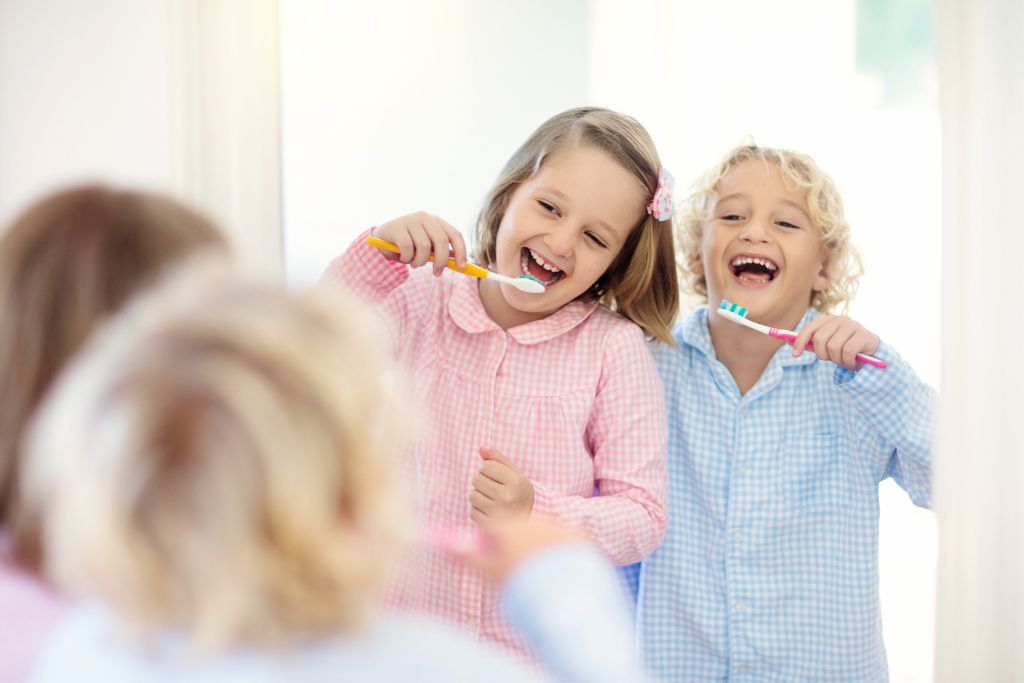
Brushing and Flossing and Fluoride, Oh My!
We know what you’re thinking! Flossing and brushing your child’s teeth is like trying to color within the lines of a picture while riding in a car on a bumpy road. It’s challenging, and you might feel like giving up. Our kiddos can be squirmy, full of energy, and just not into having you stick a toothbrush in their mouth. But oral hygiene is essential when it comes to our overall health.
Don’t give up! Keep going! A healthy, clean mouth for your kids improves their quality of life and helps them start a pattern for good oral health throughout their lives. So, keep reading to learn more about why we at KidSmiles encourage brushing and flossing from the moment your child’s first teeth erupt.
Why should my child start brushing at a young age?
Many parents do not realize they should start brushing their child’s teeth as soon as they appear. Brushing removes plaque and bacteria that can cause disease, cavities, and other issues. Our mouth health is important because bad oral hygiene can affect the rest of the body if not taken care of. To protect your child’s overall health, start an oral hygiene routine when you see those teeth coming in.
How can I encourage them to brush?
Toddlers and babies are different when it comes to brushing their teeth. Toddlers tend to suck on their toothbrushes, so you can encourage good teeth brushing by creating a morning and night routine. Brush your teeth with them or make a game out of brushing their teeth. Children tend to mimic their parents, so if you have good oral hygiene habits, they should follow along with your example. Most kids won’t adequately develop the hand-motor skills necessary to brush their teeth until they are eight. That means it’s essential for parents to take part in some of the brushing.
What about fluoride?
The AAPD (American Academy of Pediatric Dentistry) recommends using a fluoride toothpaste as soon as brushing begins to lower the risk of getting cavities. Fluoride acts like a magnet, directing needed nutrients from the saliva to the teeth. For children under 3, just a smear of paste, no more than the size of a grain of rice, is recommended. For kids three and older, a pea-sized amount of toothpaste is recommended. There is very little fluoride in over-the-counter toothpaste, and using these recommended small amounts of paste when brushing is safe.
Here are a few steps to help teach your child how to brush their teeth:
Begin by angling the toothbrush at about 45 degrees towards the gums before you begin brushing. You can hold the brush horizontally to brush the teeth, but it’s easier to switch to a vertical hold for the backs of the front teeth.
- When brushing, create small, soft, and circular strokes on all surfaces of the teeth.
- The last and often missed step is to brush your child’s tongue to remove any bacteria left behind.
- After brushing, spit, but don’t rinse. Skipping rinsing out the mouth after brushing makes the fluoride in the toothpaste more effective and saves you a step!
And there you have a VIP Smile that we love at KidSmiles!
When should my child start flossing?
Flossing is an integral part of teeth health that parents often overlook for their children. It is ideal to begin flossing when your child has teeth that touch each other on the sides, but it is never too late to start the habit. Flossing is an important step to add to your routine as teeth grow next to each other. Since kids’ mouths are tiny, it’s hard to fit our fingers into their mouths with traditional floss. For that reason, flossers (basically floss on a stick) are best for the littlest ones, and then they can transition to regular floss over time. It is recommended to floss once per day.
They are just baby teeth; they’ll fall out anyway.
Brushing baby teeth is very important, as having healthy baby teeth makes it more likely that they will have healthy permanent teeth. Adult teeth push baby teeth out as the roots of the baby teeth are resorbed. If baby teeth are full of cavities, bacteria can cause malformed adult teeth, tooth pain, and the possibility of infection. Babies are already teething regularly, so anything you can do to keep them clear of unneeded pain is ideal.
At KidSmiles, we are always here to answer your questions about your child’s oral health. Fill out the form below, and we’ll be in touch!
KidSmiles Office Hours
| Monday | Closed |
| Tuesday | 8:00 AM - 5:00 PM |
| Wednesday | 8:00 AM - 5:00 PM |
| Thursday | 8:00 AM - 5:00 PM |
| Friday | Closed |
| Saturday | Closed |
| Sunday | Closed |

